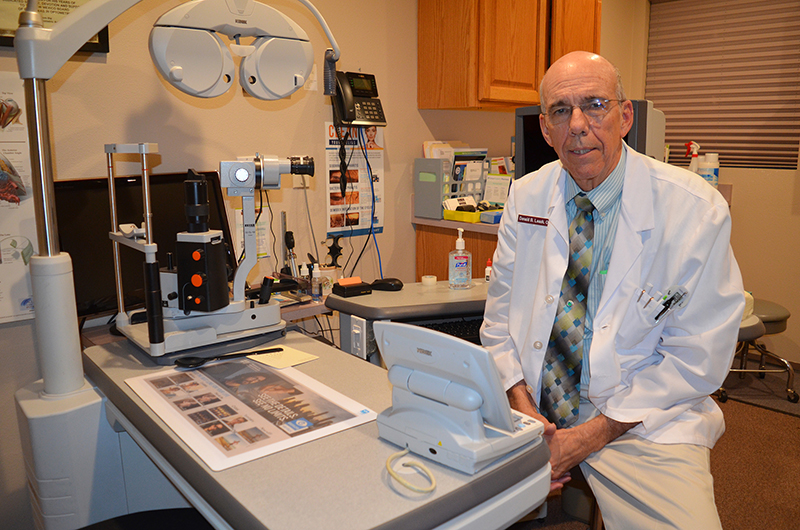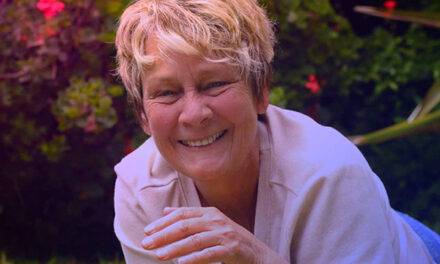
Clara Garcia | News-Bulletin photo
Dr. Donald Leach, O.D., owner and operator of Los Lunas Family Eye Care, has been practicing optometry since 1976.
Our eyes are one of the most overworked and under-treated organs in the body, and a lot of people do not pay much attention to the care of their eyes until there’s a problem.
Dr. Donald Leach, O.D., has been practicing optometry at his clinic, Los Lunas Family Eye Care, since 1976, treating generations of patients. It was his own eye problems at 17 years old that led Leach to a career in optometry.
“I had always wanted to be a musician, but I wasn’t any good,” said Leach, a graduate of Ohio State University’s College of Optometry. “I always had problems with my eyes; some learning difficulties. That changed my mind, and I went forward (toward my goal).”
Optometry is a profession specializing in vision and eye health problems, including learning-type problems with children related to vision. Leach said he can also diagnose and treat medical conditions of the eye.
“Optometrists will take care of most of the problems for most of the people most of the time as far as the eyes goes,” Leach said. “Optometrists do minor surgeries, nothing invasive.”
Eye health, Leach says, is just as important as any other medical conditions a person might have. Some people, he says, are asymptomatic to these conditions, such as with glaucoma.
Glaucoma is a disease where the nerve connecting the eye to the brain is damaged, usually due to high eye pressure.
“Some people have normal pressure in their eyes and still have glaucoma,” Leach said. “It doesn’t hurt unless the pressure is very high.”
The symptoms can start so slowly that you may not notice them. The only way to find out if you have glaucoma is to get a comprehensive eye exam.
“If they’ve always had good vision … some of them don’t start coming to the doctor until they’re 40 or 50 when they start having problems with their vision,” Leach said. “Some have already had glaucoma for 10 years and have lost some of their vision.”
While there is no cure for glaucoma, Leach says, there is a way to arrest the condition — to keep it from getting worse — with eye drops.
Much like with all other health care services, Leach advises everyone — young and old alike — to go in for an eye exam at least once a year.
“As we get older, everything gets worse,” the doctor says with a chuckle. “We see a lot of problems with our older patients, such as cataracts.”
Cataracts are the clouding of the lens of the eye. Most develop slowly over the course of years, and the main symptom is blurry vision.
“It’ll get darker or hazier — it’s like you’re looking through a dirty window,” Leach said. “It’s very common. I believe that everybody who lives long enough will get cataracts. Not everyone will have to have them removed but they’ll get them.”
Leach said the cataracts are easily treated with surgery. During cataract surgery, the doctor removes the clouded lens and replaces it with a new, artificial lens.
“These new surgeries are spectacular in how they work,” the optometrist said. “The risk is very low and the outcome is very high — 98 percent success rate. You go in in the morning and you’re home in time for lunch.
“In my practice, the patients who have gotten old with me now are over 70 years old and many of them have cataracts,” he said.
Another vision problem many have is macular degeneration, another eye disease that causes vision loss.
Leach said macular degeneration causes loss in the center of the field of vision. In dry macular degeneration, the center of the retina deteriorates. With wet macular degeneration, leaky blood vessels grow under the retina. Blurred vision is a key symptom.
“When you look at someone, you’re pointing your macula right at them,” Leach explained. “As you get older, your macula will begin to degenerate, and when it gets bad enough where you can’t even read your own mail, recognize people’s faces.”
The local optometrist said many people who are diagnosed with macular degeneration will be classified as legally blind. The main treatment for wet macular degeneration is an injection of medications.
Diabetes, Leach said, is the leading cause of blindness in the world. The disease can damage eyes over time and cause vision loss, even blindness.
Leach said diabetic retinopathy is caused by damage to the blood vessels in the tissue at the back of the eye (retina). Poorly-controlled blood sugar is a risk factor.
Mild cases can be treated with careful diabetes management, while advanced cases might require laser treatment or even surgery.
Leach is a stern believer in that people who lead a clean and healthy lifestyle will also have good eye health.
“People should eat a healthy diet — fruits and vegetables,” he said. “It makes a big difference for any condition — your eyes or your heart. It makes a difference when you stay away from these packaged foods.”
Walking for just 30 minutes a day is good for your heart, and ultimately your vision, Leach says.
“It’s really important to be examined periodically so we can catch things in the early stages,” he adds.
“Children should come in before they’re 1 (years old), and then before they start school. Then we usually suggest for a child to come in every year or two.”
In adults, Leach suggests people have their eyes examined at least once a year.
Leach also suggests wearing sunglasses to help eye health.
“They will help protect your eyes from the sun’s UV rays,” he said. “Too much UV exposure boosts your chances of cataracts and macular degeneration.”
In the 46 years since he started practicing optometry, Leach said he’s seen almost every eye injury that can happen, from rocks to metal objects.
“Most commonly is foreign bodies in the eye,” Leach said. “I’ve removed more than 4,000 from people in this community over my career. Someone comes in with something stuck in their eye almost every day.”
Leach says taking care of one’s eyes is very important. With age comes problems, but the local doctor says many problems can be avoided if you eat well, quit smoking, wear sunglasses and visit an eye doctor regularly.
Clara Garcia is the editor and publisher of the Valencia County News-Bulletin.
She is a native of the city of Belen, beginning her journalism career at the News-Bulletin in 1998 as the crime and courts reporter. During her time at the paper, Clara has won numerous awards for her writing, photography and typography and design both from the National Newspaper Association and the New Mexico Press Association.
















